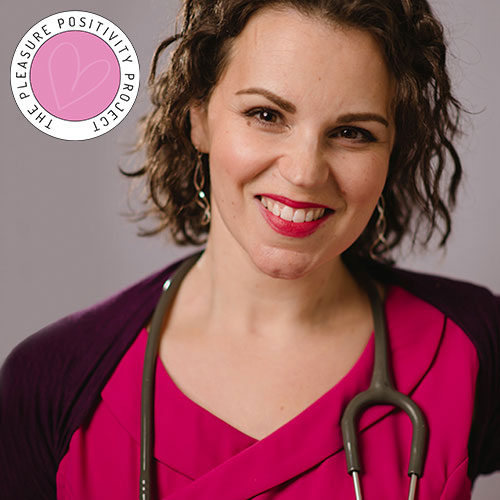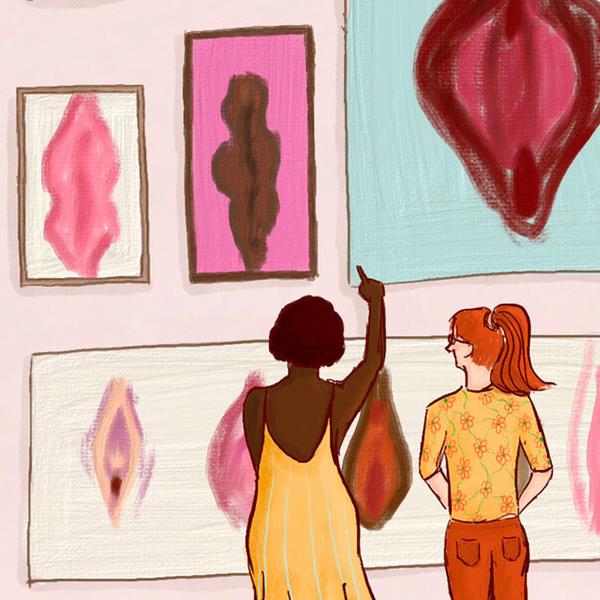
The Truth About Asexuality by Yasmin Benoit
Described as the "unlikely face of asexuality," by Cosmopolitan Magazine, Yasmin Benoit probably isn't what you'd imagine when you try and picture an asexual person. After publicly coming out as asexual in 2017, Yasmin has used the platform she gained through her edgy lingerie modelling to challenge people's ideas about asexuality and fill the void in asexual representation. She started the popular #ThisIsWhatAsexualLooksLike campaign, co-founded International Asexuality Day (April 6), and now she is launching the UK's first-ever asexual rights project in partnership with Stonewall.
Her approach to activism has always been focused on intersectionality, sex-positivity and diverse representation across all areas - whether it be academic research, TV interviews or lingerie websites.
You've probably started hearing about 'asexuality' more often over the past few years. It's a term that most of us first heard in school, usually referring to asexual reproduction, but it means a lot more than that!
What does asexual mean?
Asexuality is a type of sexual orientation, one which falls under the A in LGBTQIA+. It's characterised by experiencing a lack of sexual attraction towards anyone, regardless of their gender. As our culture becomes more sex-positive and our understanding of different sexualities expands, more people are becoming curious about asexuality and more people are starting to identify with it. However, that understanding hasn't expanded enough to combat the many myths and misconceptions about asexuality which still exist. To mark the second annual International Asexuality Day, that's what I'm here to do!
Myth: Asexual people have no sexuality
Truth: Not necessarily! There might be some asexual people out there who do feel as if they have absolutely no sexuality, which is fine, but that isn't the definition of what asexuality is. Asexuality just means experiencing a lack of sexual attraction, and sexual attraction is just one layer of sexuality. Asexual people can still have libidos. We can still masturbate and experience sexual pleasure. We can still have kinks, use sex toys, and have sex with other people if we choose to. After all, sexual attraction isn't the only reason why people have sex, and some asexual people still enjoy the process!
Myth: You can "look" asexual
Truth: There is no 'asexual way' to look or dress! As a model, people are often surprised that I put effort into my appearance and express myself through all kinds of fashion (including lingerie) when I don't experience sexual attraction and I'm not interested in having sex. They're also surprised that a young black woman would be asexual when many picture more of a Sheldon Cooper stereotype. But there is no asexual demographic, 'asexual' looks like anybody and everybody. You can still enjoy dressing up, looking glamourous or sexy, because we don't just do that for men, we do that to feel empowered ourselves!
Myth: Asexual people don't fall in love
Truth: Yes we can! Love and sexual attraction aren't mutually exclusive. There are so many different kinds of love that you can feel regardless of being sexually attracted to anyone. When it comes to romantic love, lots of asexual people still experience it and have asexual relationships. You can be romantically drawn to someone without being sexually drawn to them, just like you can be sexually drawn to someone and not romantically drawn to them. Not all asexual people are aromantic (a term which refers to those who don't experience romantic attraction). I happen to be asexual and aromantic, and while I don't fall in love romantically, there's a lot of love in my life!
Myth: Asexual people have anti-sex attitudes
Truth: There are asexual people who are repulsed by the thought of sex, or by the thought of having sex themselves. I fall into the latter category. However, that feeling does not necessarily extend to what other people are doing. The misconception that asexual people are against other people expressing their sexuality, and that all asexual people can’t stomach conversations about sex, is quite an alienating one. It leads to asexual people being left out of important discussions about sexuality, particularly in sex-positive spaces like this. It is actually incredibly common to have sex-positive attitudes and be asexual.
Myth: Asexuality is a lifestyle choice
Truth: Not true! People might choose whether or not to use the terminology, but you don't choose to be an asexual person, anymore than you choose to be straight or gay. Asexuality is often confused with celibacy or abstinence, probably because they can manifest in similar ways. In contemporary society, celibacy is often defined as being sexually abstinent, usually for religious reasons, and abstinence usually concerns restricting yourself from something you would otherwise desire. Sure, for many asexual people, their asexuality means that they aren’t interested in having sex with other people, but that’s a result of their orientation—not their beliefs about sexual behaviour. Celibacy is a lifestyle choice, asexuality is not. It isn't a state of being when you're going through a "dry spell."
Myth: There is something wrong with asexual people
Truth: In our culture, we are still taught to see certain sexualities as being more 'normal' than others. Consequently, it's assumed that if you have a more 'unusual' type of sexuality then there must be a negative reason for it. Like maybe it's a hormonal issue, the result of trauma, or a bad personality trait, or feeling jaded, or insecure, or disconnected from other people, or thinking you're too good for anyone, or not being good enough for anyone. But you really can just be asexual because that's how your sexual orientation turned out! There is no scientific evidence to suggest that there's anything physically 'wrong' with asexual people and despite attempts to pathologise any queer orientation, asexuality isn't a disorder.
Myth: Asexual people just haven’t found the right person yet
Truth: Not necessarily! The idea that asexual people just need to meet the ‘right person’ who will unlock their true sexuality and ‘fix’ their asexuality doesn't make sense. It suggests that our sexuality is reflective of our company, that no one we have ever seen or encountered has met our standards, and thus we haven’t experienced sexual attraction to the extent that the term ‘asexual’ could be applied. This assumption ignores and invalidates all of the asexual people who have found the ‘right’ person—the asexual people in happy, fulfilling, loving relationships or who have had them in the past. The validity of a relationship is not and should not be based on how sexually attracted you are to that person. It's also worth noting that your 'right' person might not even be a romantic partner.
Myth: You can't be asexual and live a fulfilling life
Truth: Wrong! Sex isn't everything. Sexual attraction isn't essential. You can live a perfectly fulfilling, complete life while being asexual. It doesn't mean that you won't be able to have meaningful relationships, or reach your full potential, to achieve your goals or make a great impact on the world. Asexuality isn't a limitation. There are people out there who will understand and accept it. It doesn't have to stop you from doing anything you want to do. It's just a different way of experiencing sexuality and no one on this planet experiences sexuality in the same way. I love being asexual, I embrace my differences, as we all should!
If you’re wondering ‘am I asexual’ after reading this you can access more information, help and support by visiting Stonewall x Yasmin Benoit Ace Project | Stonewall
your first order
Stay in the loop on all things Ann Summers:
Updates on new arrivals, inspiration, offers and events!
*Discount only available on full price products and 5% off discounted products
By inputting your information, you agree that we can use it in accordance with our Privacy Policy. You are able to unsubscribe from marketing at any time. By proceeding you agree to our Terms and Conditions.
You must be over 18 to join our mailing list.
By inputting your information, you agree that we can use it in accordance with our Privacy Policy. You are able to unsubscribe from marketing at any time. By proceeding you agree to our Terms and Conditions.
You must be over 18 to join our mailing list.
Sign up to emails and get up to 15% OFF your first order

*15% Discount only available on full price products and 5% off discounted products
Stay in the loop on all things Ann Summers: Updates on new arrivals, inspiration, offers and events!
By inputting your information, you agree that we can use it in accordance with our Privacy Policy. You are able to unsubscribe from marketing at any time. By proceeding you agree to our Terms and Conditions.
You must be over 18 to join our mailing list.
Our Benefits
Free Delivery over £50
Spend £50 or more and enjoy free UK Standard Delivery (arrives in 3 working days).
Prefer something faster or more flexible? Next Day, Click & Collect & more at checkout.
Buy Now, Pay Later
Buy Now & Pay Later with our payment partners Klarna, Paypal, and Clearpay at checkout. Get the product you want, when you want it.
Free Returns
Changed your mind? Return eligible items free of charge within 30 days.
Discreet Delivery
Your order will always arrive in plain, unbranded packaging from “AS Ltd”.

